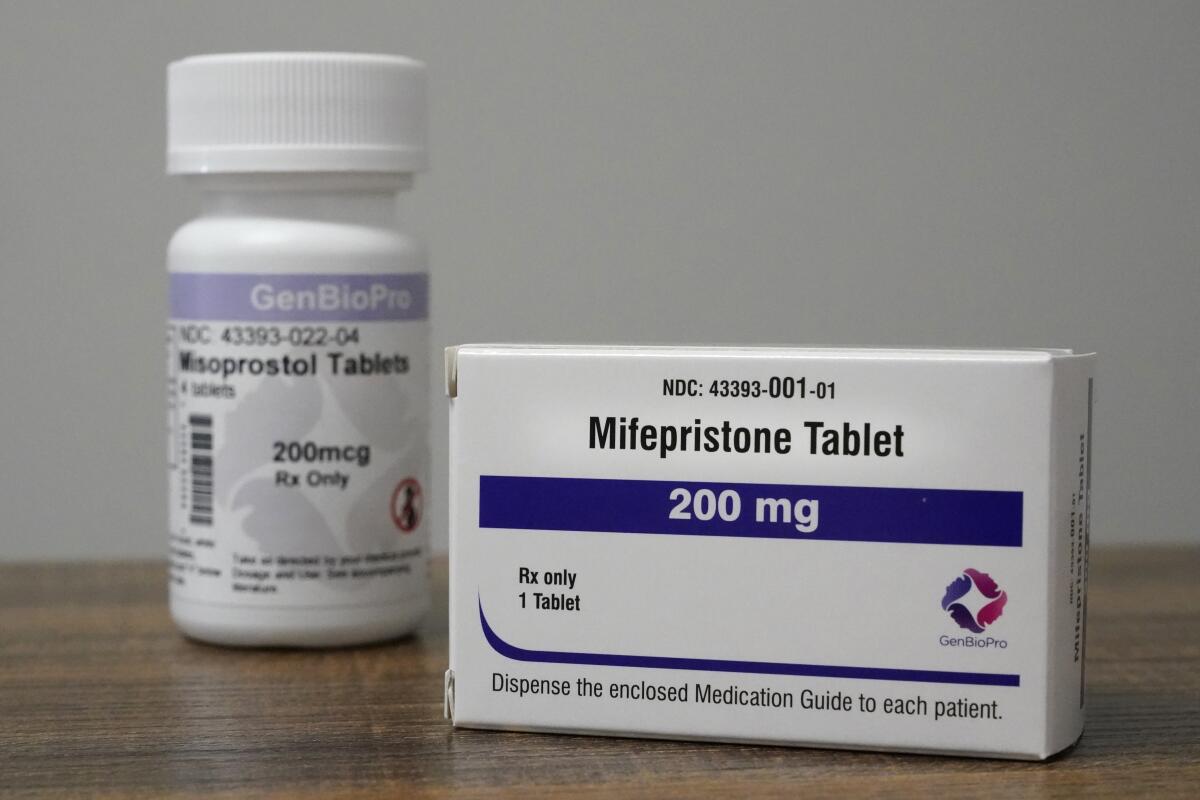Editorial: States can ban abortion, but they canât stop the mail

In these grim post-Roe days, more than half the states in the country are in the process of banning or severely curtailing access to abortion. In every state that outright bans abortion, that prohibition extends to medication abortion â a simple and safe two-pill regimen that has been available for more than two decades.
But it is not clear that bans on medication abortion are legal. Taking abortion pills is not the same as having a procedure in a clinic, and regulating drugs is not the same as regulating medical procedures. The U.S. Food and Drug Administration has long had the authority to decide what drugs are safe and efficacious and should be on the market. States regulate medical practice within their borders but generally do not have the right to override FDA decisions on drugs.
Itâs time for the federal government to go to court and argue that every state banning medication abortion has overstepped its authority and is thwarting access to an FDA-approved drug.
Itâs a novel approach and would take some effort. The administration might have to file lawsuits in every state banning medication abortion. But pursuing every legal avenue to restore at least some bodily autonomy to anyone who can get pregnant has to be the administrationâs primary concern right now.
No matter what happens in a showdown between the states and the federal government over FDA-approved drugs, the Biden administration should make it clear that no state can interfere in federal Postal Service delivery of FDA-approved drugs. What happens once the pills are on the ground and a person uses them is the more troubling issue.
Losing the right to abortion was once unthinkable. Congress must act to to preempt the court from snatching away more rights through unthinkable decisions.
Medication abortion, which can only be done in the first 10 weeks of pregnancy, accounts for 54% of all abortions in the United States. The first pill, mifepristone, blocks the hormone, progesterone, and the second pill, misoprostol, taken a day or two later, causes the uterine contractions that expel the fetus. The FDA tightly regulates mifepristone because it is only used for abortion. (The second drug has other uses beside facilitating an abortion.) Last December, the FDA got rid of the in-person visit requirement and allowed the two-drug regimen to be prescribed after a telehealth visit and sent through the mail.
If a state bans medication abortion, âit would in effect ban the sale of an FDA-approved drug,â according to three law professors â David S. Cohen, Greer Donley and Rachel RebouchĂŠ â who laid out a scenario for a court battle over the abortion bill in a draft of a forthcoming article called âThe New Abortion Battleground.â There is little case law directly on the issue of whether a state can ban an FDA-approved drug because states rarely attempt it, the authors say.
Officials in states banning all forms of abortion would probably argue that they are not outlawing the drugs, only their use for abortion. They would likely contend that Congress did not empower the FDA to âsecond guess state policies purported to protect the welfare of its citizens,â the authors speculate. States might also argue that regulating the use of abortion drugs falls within their authority to regulate the practice of medicine.
These legal questions may take considerable time to resolve â which means the federal government should begin preparing for the fight now.
In the meantime, the administration should consider making the abortion medications available without a prescription. (People are already streaming into Mexican border towns where they can get it over the counter.) The medications have been found to be safe, effective and nontoxic.
Itâs unclear how available these drugs, if made over-the-counter, would be in antiabortion states, according to UCLA law professor Cary Franklin. âIf the FDA made the pills available over the counter, that would be an even stronger sign that the federal government intended the drug to be available everywhere,â says Franklin, but antiabortion states would still probably argue that over-the-counter status doesnât trump their bans.
Anyone traveling to states where abortion is legal would only have to walk into a pharmacy to get them. Still, the process of turning a prescription drug into one that is over-the-counter can take years, if not decades. So why not work on fast-tracking it? The government could also use its spending power to mail abortion medication for no charge to anyone who requested it. There are some problems there too: People may not want to go on a website and use their name and address to order the pills. Officials in states where itâs banned may see the Biden administration as facilitating illegal abortions.
Republicans benefited from polarization on abortion both financially and electorally. In the post-Roe era, party unity on that issue is gone.
Thereâs no magic bullet to ensure access to abortion, as Health and Human Services Secretary Xavier Becerra said at a news conference Tuesday. But the hurdles shouldnât stop the Biden administration from aggressively following through on its pledge to protect access to abortion. If the administration files legal challenges to bans on medication abortions, it could ask for emergency injunctions pending an outcome at trial. If it got them, that would be a temporary victory right there.
These are dangerous days for people who are pregnant and want to have an abortion. Many will seek out abortion medications whether the drugs are outlawed or not, through websites that offer pills from foreign pharmacies and telehealth consultations with foreign-based providers â or by traveling to a state that allows abortion and going through the process far from home.
Will state authorities try to track down women taking the pills and arrest them? Will they offer bounties to report abortion pill takers? Thatâs not far-fetched. Texas and Oklahoma already have laws that allow citizens to collect at least $10,000 when they successfully sue anyone who helped a person get an abortion.
State legislatures have demonstrated they will go to extreme lengths to restrict abortion. The Biden administration needs to demonstrate it is willing to fight back.
More to Read
A cure for the common opinion
Get thought-provoking perspectives with our weekly newsletter.
You may occasionally receive promotional content from the Los Angeles Times.












